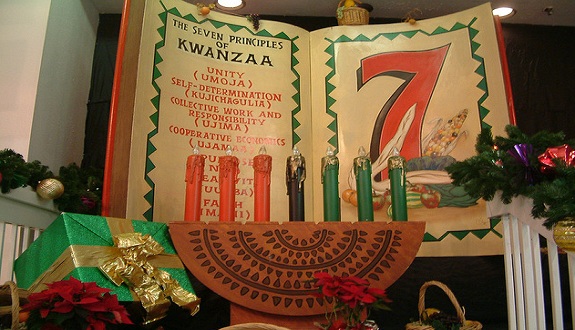Joyous Kwanzaa to LSAT takers around the world
- by
- Dec 26, 2009
- LSAT, Odds and Ends
- Reviewed by: Matt Riley


MSS would like to wish a Happy Kwanzaa to all participating in the seven-day holiday, which celebrates the seven Nguzo Saba, or principles of Kwanzaa. Since principle questions are occurring with increasing frequency on the LSAT, we see no reason that we can’t apply the principles of Kwanzaa to LSAT study.
1. Umoja (Unity)
Strive for unity with your LSAT books. Become one with logical reasoning drills and reading comp markups. Sleep with your supplement book under your pillow so you can absorb game setups through osmosis. It should be noted that umoja with your textbooks is probably inversely proportional to umoja with the opposite sex (or same sex, we’re not judgmental), but that is the LSAT study cross we all have to bear.
2. Kujichagulia (Self-Determination)
Since at this stage in your study you’re probably by yourself anyway, self-determination shouldn’t be too hard. You’ve given up a social life, pleasant activities, and a fair number of semi-important grooming habits. Make it worthwhile by determining to study and perform well on the LSAT.
3. Ujima (Collective Work and Responsibility)
Work together with your instructor, classmates, and cyber friends to maintain your resolve and hone your techniques. Working collectively does not mean watching others study while you check out Susan Boyle’s youtube video (over 120 million view and counting). You’ll need to work to put the work in collective work.
4. Ujamaa (Cooperative Economics)
A brief study in cooperative economics:
You: Mommy, I need to take an LSAT prep course.
Mommy: How much is that, Timmy?
You: mumble
Mommy: I didn’t catch that, Timmy.
You: Around $1,000.
Mommy (slapping you) Are you insane?
You: But mommy, don’t you want me to go to a good school and get a job and move out of the house?
Mommy: You live in the dorms.
You: But I graduate in 3 months. Also it’s the principle of ujamma.
Mommy: Ujamaa? The Kwanzaa principle of cooperative economics that says we should pool our resources for the collective good? Of course I’ll pay.
See? It’s not that difficult.
5. Nia (Purpose)
If you’re taking the LSAT, chances are you want to become a lawyer (or an LSAT instructor like everyone else who did well on the test but quailed at the thought of billable hours). This is your purpose, your nia. Let the LSAT take you down the path to achieve it.
6. Kuumba (Creativity)
At first I thought Kuumba was Kumbaya and I suddenly thought I’d unraveled an enigma spanning all the way back to junior high church camp. But alas, they are not the same. Use the creativity of the sixth principle of Kuumba to come up with new ways to study. In the shower, on the back of your cereal box, behind the supply tent while everyone else is in prayer meeting…new locations will invigorate your course of study and help you to keep it fresh.
7. Imani (Faith)
At this point, you’ve dedicated your life to over a month of unremitting study. You know all the methods and you’ve been practicing putting them into play. Now it’s time to have faith in your knowledge of the methods and have some confidence in yourself. You’re ready to tackle the upcoming LSAT!
Happy Kwanzaa and keep up the studying!
Search the Blog

Free LSAT Practice Account
Sign up for a free Blueprint LSAT account and get access to a free trial of the Self-Paced Course and a free practice LSAT with a detailed score report, mind-blowing analytics, and explanatory videos.
Learn More
Popular Posts
-
logic games Game Over: LSAC Says Farewell to Logic Games
-
General LSAT Advice How to Get a 180 on the LSAT
-
Entertainment Revisiting Elle's LSAT Journey from Legally Blonde








